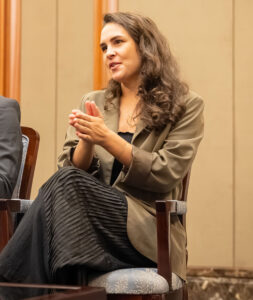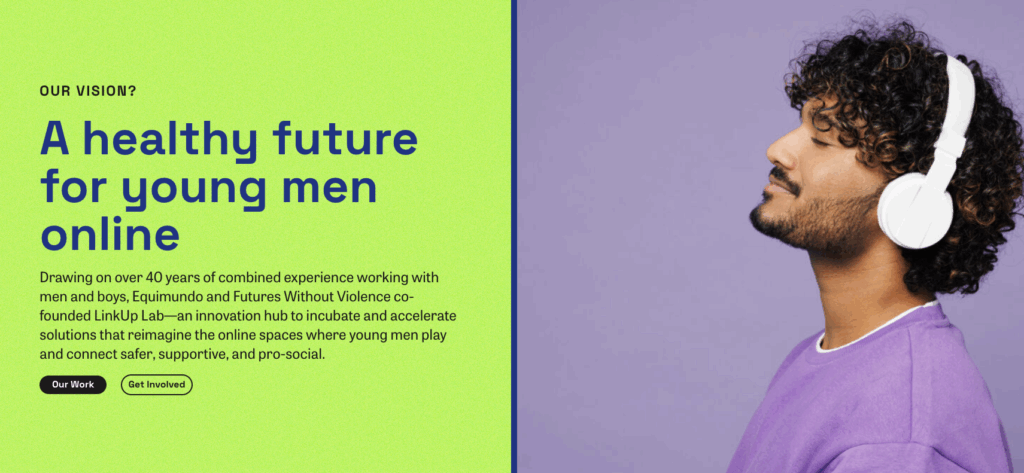At a time when young men are showing the least optimism for their futures and the lowest levels of social connection, they are increasingly finding purpose online. Building on more than two decades of work with young men, Equimundo and Futures Without Violence have launched the LinkUp Lab – an innovation hub testing digital strategies to turn the tide on harmful cultural influences that condone harm against women and proliferate anti-democratic content. The Lab, supported by the Caring Masculinity Fund, provides young men with alternative pathways to healthier relationships and masculinities that connect rather than divide.
Caroline Hayes, Equimundo’s Senior Technical Specialist on Digital Strategies, talks about the experimental work of the LinkUp Lab and its mission.

Q: Where did the inspiration for the LinkUp Lab come from?
The LinkUp Lab is informed by Equimundo’s work in developing evidence-based programs that engage men and boys in gender equality and healthy relationships. We know the wider work of Equimundo has been really successful in this space – particularly in education and health – and this history of dynamic, long-term, sustained intervention is something we really want to build on with the LinkUp Lab.
The work is also connected to the findings of Equimundo’s State of American Men report (2023) and the 2025 report, both of which revealed big upheavals and changes in terms of the ways that people – not just men and boys – are interacting with each other online, forming community bonds (or not in some cases). Nearly half of the men we surveyed said their online lives felt more engaging and rewarding than their offline lives.
We found concerning trends around men’s mental health issues, economic prospects, and feelings of optimism for the future. It also became clear that there are very few organizations actually looking at how to engage men in the digital spaces they’re increasingly spending more and more time in – and so the LinkUp Lab was born! We work like a ‘lab’ – being explorative and experimental to fill that evidence gap.
Q: The LinkUp Lab operates through three pathways Click, Connect, and Care. Can you talk to us about these?
Click, Connect, and Care is the framework we use to engage with men and boys in digital spaces.
Click represents how we want to capture the attention of men where they are already looking for information online – places like TikTok, Discord, Twitch, Reddit, Youtube, and fantasy football leagues. We know these are the places men are also most commonly searching for information about dating and romance, fitness and health, and wealth building – really quite innocuous things which aren’t inherently harmful. Unfortunately, there’s a very embedded networked group of actors in those spaces that are effective at capitalizing on those search terms, and using platform optimization techniques to actively capture their attention – and this is how men and boys can unintentionally find themselves in the ‘Manosphere.’
Click also represents the importance of disentangling dominant ideas of the manosphere as this one big, scary thing full of identical types of content. We want to understand what men and boys are actually searching for – what provides motivation, value, and pleasure in their lives? We want to learn how to direct them to the content they’re looking for, rather than simply removing or banning content or individuals.
The second step is Connect. The aim here is to connect with digital leaders already engaging with men and boys in digital spaces in healthy ways and support and upskill them. Again, we’re not looking to just capture attention and leave men there – we’re using redirection methodologies and techniques to bring men into some of these healthier communities through the topics they are already searching for, ideally moving them offline and into real-world engagement and interaction.
Lots of the moderators on Twitch and Discord, for example, are already doing this kind of community development work with men and boys in these spaces. Part of what we want to do is to work with and replicate the tools these digital leaders are already using to enable the LinkUp Lab to facilitate this kind of community building work. too.
The Care step represents promoting caring behaviors and healthy relationships for men within these online environments, redesigning them to promote healthy relationship skills and positive mental health. By working with digital community leaders, and actually engaging with platforms, we’re exploring how this approach can promote better behavior among their users.
Some of our projects might fit into just one of these pathways, and some extend across all three.
Q: Who are you collaborating with?
Collaborative working is key to the experimental nature of the LinkUp Lab. Within every ‘experiment’ we have going on, we have a diverse set of partners – many of whom we’ve never worked with before – who we collaborate with on various aspects, from research and implementation to design and evaluation. This is where my work sits within the lab; it’s a very dynamic role.
As an example, two connected projects that we’re working on with the Caring Masculinities Funds and are really excited about is our work with Harmony Labs and Diverting Hate.
With Harmony Labs, we’re doing something our field has never really done before – developing a narrative direction that moves men towards healthy relationships and community building. What we’re considering here is, if we’re engaging with men in digital spaces, what are we actually helping bring them towards? Harmony Labs is a media analysis organization that explores how narratives around various social issues get spread across different media ecosystems. It has incredible expertise in the types of content, messaging, and imagery that works in bringing men closer to where we want them to be.
The work with Diverting Hate feeds into this quite nicely as it’s concerned with how we actually implement the strategy we design with Harmony Labs. Diverting Hate works with digital community leaders (like moderators) to create targeted messaging that reaches specific audiences (like men in the manosphere), and it has the expertise to measure if the messages actually work.
Q: How do you work with moderators and digital leaders in these digital spaces?
What most companies do is invest in a paid strategy – offering money to influencers to promote their messages, for example. We’re less interested in this route, and use a few different avenues to achieve engagement in meaningful ways.
We work with these digital leaders because they want to be there; because they love the space. Moderators on sites like Discord, for example, don’t get paid but volunteer their time, so we engage with them in a way that takes this into consideration.
We also work to engage content creators who are already making content that aligns with our values and reach the audiences we want to impact.
We know, however, that this doesn’t get us access to the men and boys looking at more harmful content. To access this group, we’re having really great conversations with some social media companies interested in building a roundtable with influencers and content creators to push forward healthier content in the areas of masculinity and manhood.
Q: What are your hopes for the future of the LinkUp Lab?
It can be hard to think about the future already when we’re still deep in the early stages of the work. But what’s really nice to see is that, as we talk about the work we’re doing, more people are understanding the need for new thinking when it comes to how we can have real impact in these digital environments.
In terms of the future, I think it’s useful to think about the fact that we’re living hybrid lives – constantly on and offline, and we need hybrid techniques to engage with people that reflect the reality of this.
At a time when young men ages 18 to 23 are showing the least optimism for their futures and the lowest levels of social connection, they are increasingly finding purpose online. Some 48 percent of young men say their online lives are more interesting than their offline ones and 1 in 3 spent no time in person with someone outside their household in the prior week. Meanwhile, AI ‘aggro-rithms’ are serving young boys harmful content within 60 seconds of being online, and they increasingly drive young men towards anti-democratic, harmful content.
- 40 percent Trust Harmful Content – 40 percent of young men say they trust one or more pro-violence voices online.
- 50-Year Shift – U.S. young men are more conservative than they have been in 50 years, a trend mirrored in other countries globally.
Like never before, there is an urgent need to come together and test new ideas that invite young men to find healthy connection, belonging, and purpose. Learn more about the LinkUp Lab here.

